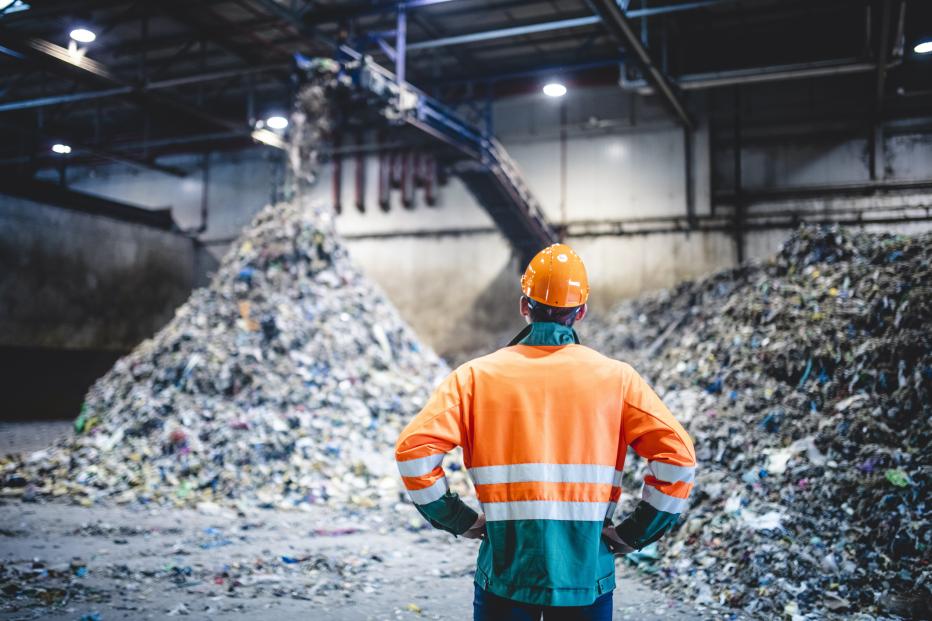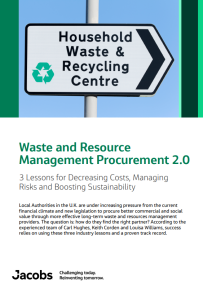
Waste and resource management services in the U.K. are under pressure to provide more value for less money. With a predicted rise in contract procurement in the next few years, how do councils create effective, compliant long-term contracts with the right partners? It starts with these industry lessons.
Waste and resources management is arguably the most underappreciated public service. It’s a highly complex industry with thousands of moving parts and partners, and it’s a logistical puzzle to ensure residential and commercial waste is managed smoothly. What the public sees and interacts with is only a tiny fraction of this critical public service.
Local Authorities (LAs), through primarily private sector contracts, are statutorily obliged to provide and operate these vital services including the following: waste and recycling collections; bring sites; Household Waste Recycling Centers (HWRCs); Bulking Facilities/Waste Transfer Stations (WTSs); Materials Recovery Facilities (MRFs); composting facilities; Anaerobic Digesters (ADs); Recovery or Energy from Waste (EfW) Facilities; and landfill and disposal facilities. Research predicts that the waste management market in the U.K. is expected to grow at a compound annual growth rate (CAGR) of 3.5% from 2020 to 2026 and will reach a value of £18.10 billion ($23.72 billion) by the end of the forecast period.
Local Authorities are under increasing pressure to procure better, more rounded waste and resources management providers to achieve more effective, long-term solutions. The question is: how do they find the right partner? According to the experienced team of Carl Hughes, Keith Corden and Louisa Williams, success relies on using these three industry lessons and a proven track record.

This paper offers insights into three critical factors to consider for unlocking the best long-term commercial and social value when procuring the next partnership for local authorities.
- Define a risk profile that’s realistic and attractive to contractors.
- Align (and iterate) with the latest legislation
- Introduce robust social value measurement framework and circular economy initiatives
About the authors

Louisa Williams has over 20 years’ experience in resource and waste management. She has extensive experience in circular economy and resource efficiency on large waste procurements, which complements her waste and materials compliance and planning knowledge. She has an operational background (working for Suez for four years on a Household Waste Recycling Centre contract) that helps influence practical solutions. Louisa helps clients develop waste procurement processes, packages and documentation from pre-procurement through to implementation.

Carl Hughes is an engineer with over 25 years’ experience in the environmental industry with a background in waste and contract management. Carl has been responsible for developing and implementing project strategies for the procurement of refuse and recycling collection systems, transfer and bulking operations and residual treatment facilities for many local authority projects. He has worked with several organizations such as the rail franchises, utility companies, police, NHS and major supermarkets to deliver waste services and help embed environmental and sustainability as part of their procurement process.

Keith Corden is a Chartered Engineer, Chartered Waste Manager, and Chartered Environmentalist with principal responsibilities for delivery of infrastructure and procurement projects. His duties include project direction of multi-disciplinary teams undertaking feasibility studies, Environmental Impact Assessments, outline and detailed designs, procurement advice, commercial negotiations, contract preparation, tendering, tender evaluation, contract award, contract administration, site supervision, and facility commissioning and handover on a range infrastructure projects. His recent responsibilities are as Project Director and Technical Adviser in the procurement of long-term (25 - 30 year), multi-billion PPP/PFI waste infrastructure projects.












































